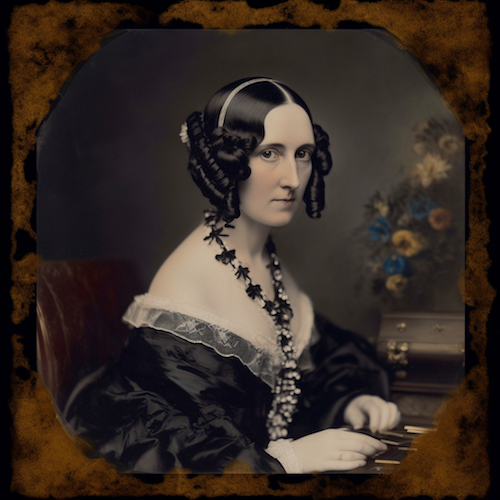¶ Ada Lovelace: A Trailblazing Mathematician and Visionary

¶ Introduction
Ada Lovelace, born Augusta Ada Byron in 1815, was a remarkable figure whose contributions to mathematics and computing continue to inspire countless women around the world. Her groundbreaking work in the mid-19th century laid the foundation for modern computing and positioned her as a pioneer in the field.
¶ Early Life and Influences
Ada Lovelace was born on December 10, 1815, in London, England, to the famous poet Lord Byron and his wife, Anne Isabella Milbanke. Despite her parents' separation shortly after her birth, Ada's mother ensured she received a comprehensive education in mathematics and science, aiming to shield her from the perceived "madness" that ran in her father's family.
¶ A Passion for Mathematics
Ada Lovelace's interest in mathematics flourished at a young age. Encouraged by her mother, she studied the subject rigorously, guided by tutors and mentors who recognized her prodigious talent. Ada's mathematical prowess quickly became evident, and she developed a fascination with Charles Babbage's Analytical Engine, an early mechanical computer.
¶ Collaboration with Charles Babbage
Ada's collaboration with Charles Babbage proved to be transformative. Babbage, an inventor and mathematician, conceived the concept of the Analytical Engine, a revolutionary device that could perform complex calculations. Recognizing Ada's mathematical acumen, Babbage enlisted her help in translating an article by an Italian mathematician about the Analytical Engine.
¶ The Birth of Computer Programming
Ada Lovelace's translation of the article evolved into something extraordinary. She not only translated it but also added her own extensive annotations, including a groundbreaking algorithm for calculating Bernoulli numbers using the Analytical Engine. These annotations, which detailed step-by-step instructions for the machine, are considered the first known computer program, making Ada Lovelace the world's first computer programmer.
¶ Ada's Visionary Insights
Ada Lovelace's contributions went beyond mere programming. She possessed a visionary outlook that extended beyond the capabilities of the Analytical Engine at the time. In her notes, Ada contemplated the potential of the machine to go beyond number-crunching and handle other types of data, including music and art. Her remarkable insights foresaw the vast possibilities of computing that would only be realized many decades later.
¶ Legacy and Influence
Ada Lovelace's legacy continues to resonate in the world of technology and beyond. Her visionary concepts and forward-thinking ideas earned her recognition as the first person to envision the transformative power of computers beyond mere calculations. Today, she is celebrated as an inspiring figure for women in STEM fields, reminding us of the immense potential and impact women can have in the world of technology.
¶ Ada Lovelace Day
In recognition of Ada Lovelace's contributions, Ada Lovelace Day is celebrated annually on the second Tuesday of October. This day aims to raise awareness about the achievements of women in science, technology, engineering, and mathematics (STEM) and inspire future generations of women to pursue careers in these fields. Ada Lovelace Day serves as a powerful tribute to her enduring legacy.
¶ Death
Ada Lovelace's life was tragically cut short at the young age of 36. Despite her brilliant mind and remarkable achievements, she succumbed to uterine cancer on November 27, 1852. Her passing was a tremendous loss to the world of science and computing, as she had already made profound contributions that would shape the future of technology.
¶ FAQs
¶ What were Ada Lovelace's main accomplishments?
Ada Lovelace's main accomplishments include her translation and extensive annotations on the Analytical Engine, which are regarded as the first computer program ever written. She also envisioned the potential of computers to handle various types of data beyond calculations.
¶ How did Ada Lovelace contribute to the development of computing?
Ada Lovelace's contributions to computing were groundbreaking. Her work on the Analytical Engine provided a foundation for future advancements in computer programming and paved the way for the modern computer age.
¶ Why is Ada Lovelace considered an inspiring figure for women?
Ada Lovelace's achievements and visionary insights in a male-dominated field serve as an inspiration for women seeking to pursue careers in STEM. She shattered gender barriers and demonstrated that women have the ability to excel in traditionally male-dominated domains.
¶ What is the significance of Ada Lovelace Day?
Ada Lovelace Day celebrates the accomplishments of women in STEM fields and aims to encourage more women to pursue careers in science, technology, engineering, and mathematics. It serves as a reminder of Ada Lovelace's enduring influence and the importance of gender diversity in these fields.
¶ How did Ada Lovelace's upbringing influence her career?
Ada Lovelace's mother ensured she received an excellent education in mathematics and science, which laid the foundation for her remarkable career. Her upbringing provided her with the tools and knowledge to excel in her chosen field.
¶ Was Ada Lovelace recognized for her contributions during her lifetime?
Ada Lovelace's work did not receive significant recognition during her lifetime. It was only in the mid-20th century that her contributions to computing were rediscovered and widely acknowledged.
¶ What is the Analytical Engine?
The Analytical Engine was an early mechanical computer concept designed by Charles Babbage. It was designed to perform complex calculations and is considered a precursor to modern computers.
¶ How did Ada Lovelace's work influence modern computing?
Ada Lovelace's work laid the foundation for modern computing and programming. Her visionary insights and concepts foreshadowed the capabilities of computers beyond mere calculations, influencing the development of technology we use today.
As we reflect upon Ada Lovelace's life and accomplishments, we are reminded of the immense impact a single individual can have on the world. Ada's remarkable contributions to mathematics and computer programming continue to inspire women to pursue their passions in STEM fields and challenge societal norms.
Sources:
https://en.wikipedia.org/wiki/Ada_Lovelace
https://www.britannica.com/biography/Ada-Lovelace
https://www.adalovelaceinstitute.org/blog/celebrating-ada-lovelace-day/
“Ada Lovelace: The Making of a Computer Scientist”, Ursula Martin and Adrian Rice